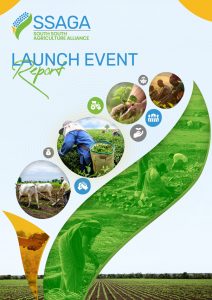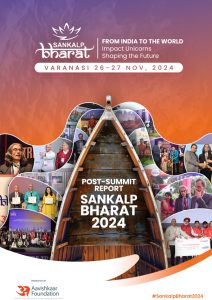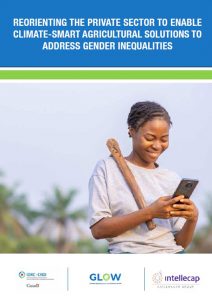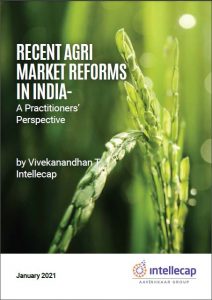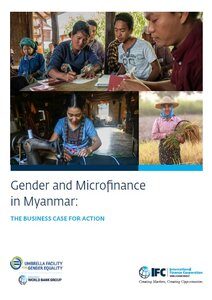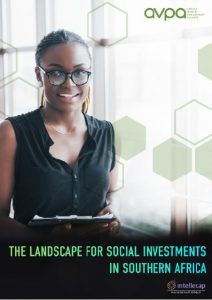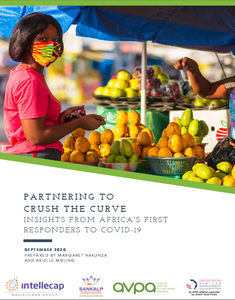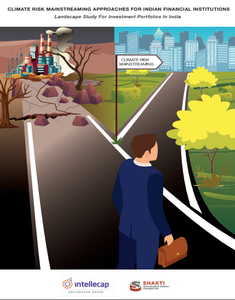TRENDING
-
SSAGA – Benefitting small-scale farmers by fostering innovations and collaboration across the Global South
Published: March, 2025 -
Sankalp Bharat 2024-Post Summit Report
Published: March, 2025 -
Reorienting The Private Sector To Enable Climate-smart Agricultural Solutions To Address Gender Inequalities
Published: February, 2025
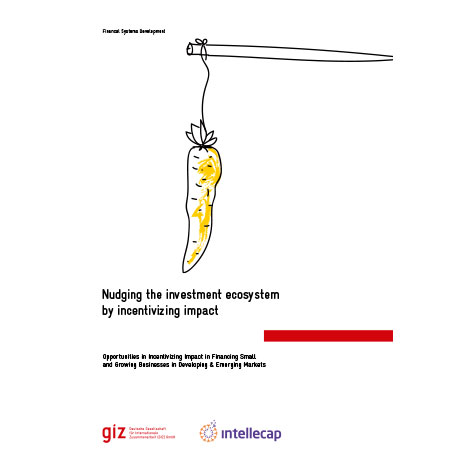
Nudging The Investment Ecosystem By Incentivizing Impact
PUBLISHED: June, 2018
Opportunities in Incentivizing Impact in Financing Small and Growing Businesses in Developing & Emerging Markets
This paper is a summary of fresh ideas on how to channel more capital into impact investing and incentivize impact creation. Building on insights generated by experts at the BMZ hosted conference Financing Global Development – Leveraging Impact Investing for the SDGs, the paper furthers the conversation on Impact Measurement and Management, IMM 2.0, through brainstorming practical ideas and viewpoints in the impact investing value chain: those who provide capital, those who manage it, and those who receive it. This included close to 50 stakeholders, including fund managers, DFIs, intermediaries, entrepreneurs, governments, CSOs and others.
The discussion, conducted in the form of a ‘design lab’ by Deutsche Gesellschaft für Internationale Zusammenarbeit (GIZ) GmbH, Intellecap, and the Swiss Agency for Development and Cooperation (SDC), aims to start a conversation on how to maximize impact by channeling capital into small and growing businesses (SGBs) as a way to expedite achievement of SDGs (Sustainable Development Goals). During the session, industry leaders like FMO, Vox Capital, and Roots of Impact had shared case studies of good practices in incentivizing impact along the investment chain. This formed the basis of brainstorming on development of new ideas on innovative instruments that could nudge the ecosystem towards more actively pursuing and scaling impact.
The result is an analysis of the barriers in the impact investment value chain highlighted during the stakeholder conversations, and key insights on how to overcome them (for example, the need for transparency, standardization, leadership, etc.). In addition, the workshop collated a list of potential ‘wild ideas’ to like impact currency, impact rewards, impact index, online market places for impact auctioning, and a give-back distribution impact support system, designed to incentivize increased levels of investment along the value chain. The practical approaches suggested by stakeholders fit well with the existing impact measurement and monitoring frameworks like GIIN’s IRIS and Intellecap’s PRISM and hold the potential to guide impact capital more efficiently by leveraging good practices.

The Financial Lives of Government Employees – Potential of Digital Finance in Sierra Leone
PUBLISHED: July, 2018
This report documents findings from research on the financial lives of government employees in Sierra Leone, commissioned by the Government to People Payments Project – Building Digital Ecosystem funded by USAID. Intellecap supported UNCDF, Government of Sierra Leone and Bank of Sierra Leone for conducting the research.
There are 80,000 government employees in Sierra Leone who receive salaries digitally in their bank accounts. Insights about their financial lives can help build a viable business case for DFS to expand access to a wide range of financial services for underserved communities in Sierra Leone. Such insights can inform strategies and use cases that the UNCDF and the Government of Sierra Leone can develop to promote DFS in the country. The National Strategy for Financial Inclusion 2017 – 2020 also refers to the need to identify and digitize use cases that will lead to habitual usage, and achieve Sierra Leone’s commitments to the ‘Better Than Cash Alliance’.
Recognizing the need and opportunity, UNCDF supported the Financial Lives Survey of government employees who receive their salaries digitally in Sierra Leone. Intellecap designed the survey to understand how government employees utilize salaries transferred into their bank accounts, their awareness of and access to DFS, avenues to use them and their perceptions about financial services and digital financial transactions. This report contains insights from the survey about potential customers of DFS and recommendations on use cases that could be piloted as an initial step to improve DFS adoption in Sierra Leone.
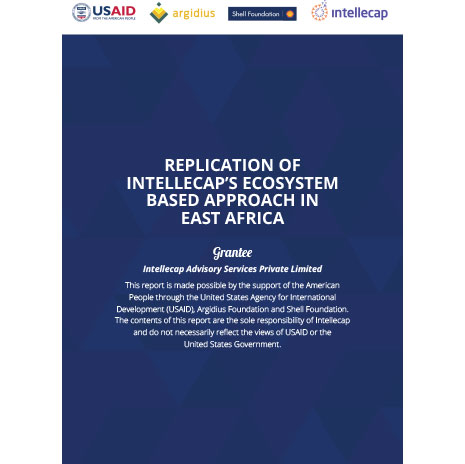
Replication of Intellecap’s Ecosystem Based Approach in East Africa
PUBLISHED: July, 2018
Intellecap has sought to replicate its ecosystem-based approach to East Africa by bringing
together capital, knowledge and networks to support SGBs at two levels: (i) provide direct support
to SGBs in the form of acceleration, fund-raising, technical assistance, innovation transfer, and
market linkages, and (ii) discover and engage critical ecosystem players such as corporations
(both local and international), accelerators, other development sector players in supporting SGBs.
In the three-year period since the launch of our initiative to replicate our ecosystem-based
approach for accelerating entrepreneurship support to SGBs in East Africa, we have received
generous support not only from our funders, but also from a number of local and international stakeholders such as development institutions, private sector entities, and industry associations.
Over the last year, we have replicated our advocacy platform (Sankalp), angel investment network
(I3N) advisory services (consulting & investment banking), virtual incubation platform
(StartupWave) and impact measurement platform (PRISM) as envisaged at the beginning of our
programmatic support. The development and adaptation of StartupWave for East Africa has
resulted in over 450 sign-ups for our early stage enterprise support activities and partnerships with
over 30 incubators / accelerators. Similarly, PRISM, our impact measurement platform, has
garnered interest from a wide variety of players to measure the impact of their programs.
All Publications
-
On the potential of GLI to further women’s economic and social empowerment – An assessment of women-focused enterprises in South East Asia and East Africa
PUBLISHED: March, 2021READ MORE -
Decentralised Solar Refrigeration: Opportunities in the Livelihood Appliances Market in India
PUBLISHED: January, 2021READ MORE -
Recent Agri Market Reforms in India – A Practitioner’s Perspective 2021: White Paper by Vivekanandhan T, Intellecap
PUBLISHED: January, 2021READ MORE -
Gender and Microfinance in Myanmar: A Report by IFC Myanmar in collaboration with Intellecap
PUBLISHED: December, 2020READ MORE -
The Landscape for Social Investments: Sub Saharan Africa Comparative Analysis
PUBLISHED: November, 2020READ MORE -
The Landscape for Social Investments in East Africa : Intellecap Africa and AVPA Report 2020
PUBLISHED: November, 2020READ MORE -
The Landscape for Social Investments in Southern Africa: Intellecap Africa and AVPA Report 2020
PUBLISHED: November, 2020READ MORE -
The Landscape for Social Investments in West Africa : Intellecap Africa and AVPA Report 2020
PUBLISHED: November, 2020READ MORE -
Partnering to Crush the Curve: Insights from Africa’s First Responders
PUBLISHED: October, 2020READ MORE -
Intellecap With Shakti Foundation Brings Out A Report On Climate Risk Mainstreaming – Approaches For Indian Financial Institution
PUBLISHED: October, 2020READ MORE - Agri market reforms alone will have little effect on small and marginal farmers as many of them are in to subsistence production
- The provisions under contract farming and the infrastructure development support available under Agriculture Infrastructure Fund have the right incentives to move small & marginal farmers from subsistence cereal crop to commercial cash crop farming.
- Agri market reforms by the Government of India have adopted a market led approach for development of production & marketing infrastructure
- Though the recent agri reforms have paved way for market players to invest in improving production & marketing infrastructure, however they cannot completely replace the deficit public investment long overdue in the agriculture sector.
- Agri market reforms have increased FPOs’ ease of transaction with farmers and FPOs are now increasingly recognized as entities that represent the collective interests of their member farmers (in contrast to a private enterprise)
- Though the FPO formation has been taken up aggressively by the Government of India, however the sustainability of these business enterprises still remains largely unaddressed
- The role of support ecosystems become critical for sustainability of FPOs beyond government’s mission mode of FPO formation
- As market forces are ruthless and weed out players who aren’t resource efficient , any form of government support or ecosystem support are only a necessary condition but not a sufficient condition for FPOs to prosper
- Alternatively established corporates and business houses can co-opt FPOs in to their supply/distribution chain and can help them to build capacities & create efficiencies.
- There are successful working models of joint ventures between FPOs & large private players that are creating value for farmers at the same time competing successfully with other players in the market
- By limiting the role of APMC, the Government of India has created a policy push for “one nation one market” initiatives
- APMC mandis played a critical role in price discovery for certain essential commodities. The price discovery mechanisms that shall play out in the new age markets will require further attention.
- As the agri market reforms have now enabled direct procurement from farmers, there is an increasing need for legal provisions & legal counsel to protect farmers in the case of buyers not honoring payments.
- Though the New Farm Acts, 2020 have defined aspects of e-trade however crucial elements like e-marketing and e-market places have not been covered.
- New age agri market players in their pursuit of higher margins, may end up taking multiple position in the agri value chain, thereby creating “conflict of interest” or/and “concentration of risk”
- These forces may lead to market failures which in turn has the potential to destroy the trust in the functioning of agriculture markets
- Like in the case of FPOs the agri market reform have also enable Agri start up to deal directly with farmers, thereby reducing the transaction cost and time
- The agri market reforms have also created an opportunity for all types of private enterprises including agri startups to participate in primary agriculture production and primary agriculture marketing
- As agriculture markets are getting liberalized, there is a need for a market regulator to create level playing field and prevent creation of oligopolies and other forms of collusion
- Among the different set of private players, corporates and large enterprises are better positioned to make investments in improving agriculture infrastructure
- Though the agri market reform have created sufficient incentives to attract private investment, there are limited use cases readily available for private investment
- It is also worthwhile to observe how the existing value chain players consolidate their positions and take advantage of the emerging new age value chains.
- In the recent past organized markets like cotton has suffered from the influence of speculative market forces, which have found their way to influence commodity prices.
- As farmers are the most vulnerable, there is a need for agencies to protect farmers’ interest from the adversities of complex market dynamics
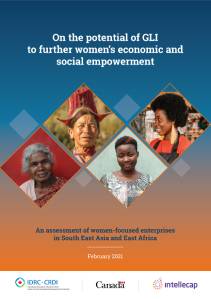
On the potential of GLI to further women’s economic and social empowerment – An assessment of women-focused enterprises in South East Asia and East Africa
PUBLISHED: March, 2021
This report is part of a wider study that aims to understand the impact of gender lens investing on women’s social and economic empowerment. It seeks to build a case for gender lens investing in women-focused enterprises through primary research with over 20 such enterprises and over 150 of their women employees, partners and customers across India, Indonesia, Kenya and Rwanda. The research focused on enterprises that either employ women or provide critical products/ services for women, while also engaging with the women employees/ partners/ customers of these enterprises to understand the social as well as economic impact that employment and/or usage of gender-focused products creates on their lives.
The objective is to bring out the potential for contributing towards the empowerment of women employees, value-chain-participants and customers of such businesses, by investing in them (with a gender lens) so that they become more visible as a target segment for gender lens investors. To this end, the report brings out stories of impact on women’s agency, leadership skills, improved support structures and renewed aspirations.
The report concludes by building on existing gender evaluation toolkits and posits a framework of questions which can guide financial institutions and incubator/ accelerator programs on factors that will improve their level of awareness about GLI beyond women entrepreneurship/leadership, integrate gender-sensitive parameters in their evaluation frameworks, and reorient operational aspects to ultimately channel both financial and non-financial support with a gender lens.

Decentralised Solar Refrigeration: Opportunities in the Livelihood Appliances Market in India
PUBLISHED: January, 2021
This report is the outcome of a study carried out by Intellecap, supported by GOGLA. It aims to generate evidential information on the potential of off-grid solar refrigeration across key market segments (healthcare, households, micro-enterprises, farm-gate, and dairy) in India. It also maps the existing ecosystem of the off-grid solar refrigerator sector and provides recommendations to support market development of this sector.

Recent Agri Market Reforms in India – A Practitioner’s Perspective 2021: White Paper by Vivekanandhan T, Intellecap
PUBLISHED: January, 2021
Government of India (GOI) had recently enacted three acts related to agriculture marketing in the country; these acts have come closely on the heels of other agriculture related measures from the government.
These measures together form a part of government’s larger mission to double farmers’ income by 2022-23. In this backdrop Intellecap had organized a panel discussion on the recent agriculture market reforms; the session was organized as a part of Intellecap virtual Sankalp Global Summit 2020.
The panel discussion titled “Recent Agri reforms- Shifting grounds for FPOs, Agri startups, and Philanthropic capital” was organized on 2nd November 2020. The panel consisted of experts from i) World bank ii) NGOs working with small holder farmers and FPO formation iii) Agri e-market makers and iv) Agri start up working with FPOs.
The perspectives and some deep insights on topical issues are synthesized and presented under following categories: a) Small and Marginal Farmers’ perspectives; b) Production system perspectives; c) FPO perspectives; d) Agri market place perspectives; and e) Agri startup perspectives and f) Other ecosystem perspectives. This document titled “Recent Agri reforms in India- Practitioners’ perspective” aims to take these insights to a wider audience and to take forward some of the pertinent issues for further policy deliberations.
Snapshot of the insights
Small & Marginal farmers’ perspectives:
Production system perspectives:
FPO perspectives:
Agri market place perspectives
Agri start-up perspectives:
Other ecosystem perspectives:
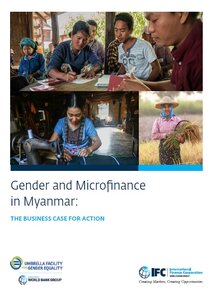
Gender and Microfinance in Myanmar: A Report by IFC Myanmar in collaboration with Intellecap
PUBLISHED: December, 2020
IFC’s Gender and Economic Inclusion Group and Financial Institutions Group mandated Intellecap to understand the current gender gaps in the microfinance sector in Myanmar and to suggest possible actions to increase gender equality for MFI employees and clients.
As part of this study, Intellecap analyzed gender gaps in the current landscape of the microfinance sector in Myanmar for employees and clients of MFIs.The study contains findings from a survey of over 1,600 employees from eight leading microfinance institutions in Myanmar, as well as interviews with over 450 women microfinance clients. It sought to examine the gender dynamics in the Myanmar microfinance industry, and outline the opportunity for the sector to more effectively meet the needs of women both as clients and employees.
The findings identify the opportunity for the sector to better tailor products and services to meet the needs of women clients who make up about 60 percent of microfinance borrowers in the country. It also outlines how making the microfinance sector more gender inclusive has the potential to deliver multiple benefits, including improving the safety and comfort of both women and men employees at work; establishing an equal opportunity culture which encourages more women to become part of leadership; and helping to attract and retain talent.

The Landscape for Social Investments: Sub Saharan Africa Comparative Analysis
PUBLISHED: November, 2020
Social investment is an umbrella term that brings together diverse categories of funders aiming to achieve social and/ or environmental impact. Broadly, social investments include financial and non-financial support deployed via venture philanthropy, impact investing (with a focus on investing for impact), and socially responsible investing. Social investment methodologies have proven to be a powerful strategy to create sustainable and scalable social and environmental impact by enabling diverse social investors to collaborate for a more significant impact on the achievement of the SDGs. Collaboration across different types of capital and investment strategies is needed, referred to as the “continuum of capital”.
Established in 2018, the African Venture Philanthropy Alliance (AVPA) is a Pan-African network that seeks to drive a transformative social investing agenda in the continent. AVPA leverages the experience and momentum gained by the European Venture Philanthropy Association (evpa.eu.com) and the Asian Venture Philanthropy Network (avpn.asia) – thriving networks that together have over 800 members in more than 50 countries and are proven catalysts for mobilizing capital and helping members to deploy it more effectively to drive positive change. AVPA facilitates the flow of human, intellectual and financial capital, not only within Africa, but also with the vast network of members across the 50+ countries outside of Africa. AVPA seeks to support the sector through several key service lines offered to its members.
Please read and download our regional social investments landscape reports:
1. The Landscape for Social Investments in East Africa : Intellecap Africa and AVPA Report 2020
2. The Landscape for Social Investments in Southern Africa: Intellecap Africa and AVPA Report 2020
3. The Landscape for Social Investments in West Africa : Intellecap Africa and AVPA Report 2020

The Landscape for Social Investments in East Africa : Intellecap Africa and AVPA Report 2020
PUBLISHED: November, 2020
The Landscape for Social Investments in Africa, maps the diverse field of social investment across East, West and Southern Africa. In each of these regions, hundreds of institutions are deploying capital to achieve ambitious social and environmental goals.
Social investors include foundations, corporates, family offices, high net worth individuals, sustainability-aligned fund managers, development finance institutions, bilateral and multilateral donors, governments, diaspora, and faith-based organisations.
This report maps the landscape of social investments in East Africa with a deep dive focus on Kenya, Uganda and Tanzania, and a high-level assessment of Rwanda, Ethiopia and South Sudan. This report maps these providers of social capital, their investment strategies, and opportunities for collaboration amongst the various investors. Much more innovation and collaboration amongst social investors is needed if African countries are to close the enormous Sustainable Development Goals (SDG) financing gap.

The Landscape for Social Investments in Southern Africa: Intellecap Africa and AVPA Report 2020
PUBLISHED: November, 2020
The Landscape for Social Investments in Africa, maps the diverse field of social investment across East, West and Southern Africa. In each of these regions, hundreds of institutions are deploying capital to achieve ambitious social and environmental goals.
Social investors include foundations, corporates, family offices, high net worth individuals, sustainability-aligned fund managers, development finance institutions, bilateral and multilateral donors, governments, diaspora, and faith-based organisations.
This report, maps the landscape of social investments in Southern Africa with a deep dive focus on South Africa, Zambia, and Mozambique, and a high level assessment of Angola, Botswana, and Zimbabwe. This report maps these providers of social capital, their investment strategies, and opportunities for collaboration amongst the various investors. Much more innovation and collaboration amongst social investors is needed if African countries are to close the enormous Sustainable Development Goals (SDG) financing gap.

The Landscape for Social Investments in West Africa : Intellecap Africa and AVPA Report 2020
PUBLISHED: November, 2020
The Landscape for Social Investments in Africa, maps the diverse field of social investment across East, West and Southern Africa. In each of these regions, hundreds of institutions are deploying capital to achieve ambitious social and environmental goals.
Social investors include foundations, corporates, family offices, high net worth individuals, sustainability-aligned fund managers, development finance institutions, bilateral and multilateral donors, governments, diaspora, and faith-based organisations.
This report maps the landscape of social investments in West Africa with a deep dive focus on Nigeria, Ghana and Ivory Coast, and a high-level assessment of Senegal, Sierra Leone and Liberia. It analyses strategies used by various international and domestic social investment capital providers. This report maps these providers of social capital, their investment strategies, and opportunities for collaboration amongst the various investors. Much more innovation and collaboration amongst social investors is needed if African countries are to close the enormous Sustainable Development Goals (SDG) financing gap.
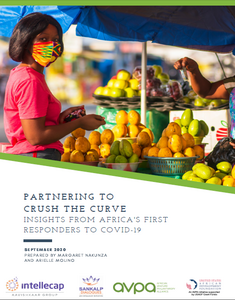
Partnering to Crush the Curve: Insights from Africa’s First Responders
PUBLISHED: October, 2020
It is no secret that the Covid-19 pandemic hi t us like a tsunami , unawares and unprepared. As the pandemic continues to overwhelm countries around the globe, it has transformed the way we live, work and even interact within our communities.
Africa was one of the last continents in the world to contract the virus, and watched the rest of the world battle the pandemic, knowing it would eventually hit and knowing that the impact would be devastating.
To begin with, most countries in Africa have precious healthcare systems in place and the vast major i ty of people have no access to health insurance. For instance, 4 out of 5 people in Kenya lack health insurance.
[ 1 ] Africa witnessed first-world countries with advanced health care systems, hospitals, and equipment get quickly over run and overwhelmed by the virus. If they couldn’t handle Covid-19, how on earth would Africa manage this disease?
Furthermore, Africa’s informal economy makes up approximately 41% of its GDP.
[2] The very nature of this informal economy has no cushioning – for those who are informal workers, not working means not getting paid. And not getting paid means you can’t feed your family for every day you can’t work. An economic slowdown in Africa means that a vast majority of people will no longer be able to feed their families on a daily basis. Stay-at-home mandates for many low-income day laborers in Africa means they will be starving. Most people would run the risk of exposure to Covid-19 by working, rather than starve because they can’t generate an income staying at home.
To address these issues, various organizations have been taking urgent actions to assist the families living in these communities, but most organizations are still testing the waters to see what works and what doesn’t . Some are adapting already existing measures to better suit the crisis, but all are piloting and pivoting as they go. With most African countries facing similar challenges, from poor and ill equipped healthcare systems to over run informal settlements and congested public transport , there is a great opportunity for these initiatives to learn from each other ,within and across borders, to lessen Covid-19’s impact on the continent .
We launched this series to facilitate learning, highlight successful examples, and promote collaboration across the African continent . The approaches for dealing with Covid-19 in Africa will – and should – look distinctly different from other parts of the World. There is no silver bullet , but we hope these learnings and insights will help not only shorten learning curves for dealing with Covid-19, but ultimately, rebuild our ecosystems to be stronger and more resilient in the future.
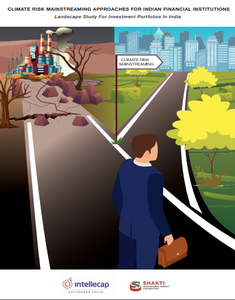
Intellecap With Shakti Foundation Brings Out A Report On Climate Risk Mainstreaming – Approaches For Indian Financial Institution
PUBLISHED: October, 2020
India alone lost over USD 80 billion in economic losses over two decades (2000-2019) due to climate change. According to estimates, climate change could cost businesses and investors across the world over USD 1.2 trillion over the next 15 years.there is a growing realization that the community including businesses and investors need to be more proactive in incorporating climate risk considerations in their operations along with Government which need to include climate change resilience initiatives in its policies. This initiative aims to map the understanding of financial institutions in India on climate risk mainstreaming requirements as well as implementation strategies.
Reports & Policies
Our Impact Map

Sign up for our newsletter
© Copyright 2018 Intellecap Advisory Services Pvt. Ltd. - All Rights Reserved



